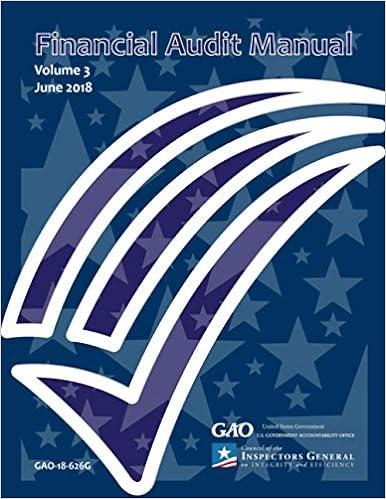Question
Classifying Debt On December 31 of Year 10, Millers Grocery Inc. had a 10-year, 7% note payable balance of $100,000. The note payable was originally
Classifying Debt
On December 31 of Year 10, Millers Grocery Inc. had a 10-year, 7% note payable balance of $100,000. The note payable was originally issued on June 30 of Year 1. The company's current year financial statements are dated December 31 of Year 10 and the financial statements were issued on March 15 of Year 11.
How will the note payable in each of the following separate scenarios be classified on the balance sheet of Millers Grocery on December 31 of Year 10?
a. The company intends to pay off the note payable when it comes due.
b. The company intends to refinance the note payable and will begin discussions with the lender in February of Year 11.
c. The company issues common stock in January of Year 11. Immediately, $75,000 of the proceeds of the issuance plus $25,000 in cash are used to pay off the note payable.
d. The company enters into a refinancing agreement dated January 31 of Year 11, which allows the issuance of debt up to 50% of the companys inventory balance, which is expected to be $175,000 during Year 11. The interest rate in the refinancing agreement is 6.5% and the debt agreement expires on December 31 of Year 13.
e. The full $100,000 of the 7% note payable was extinguished on February 1 of Year 11, when it was paid off with a $100,000, 8%, interest- bearing note payable, due February 1 of Year 16.
f. Assume that the note payable was issued on June 30 of Year 10. The note payable includes a provision that allows for the lender to call the note at any time. However, the lender has indicated that it does not intend to call the note in Year 11.
g. Assume that the note payable was issued June 30 of Year 9, instead of June 30 of Year 1. Millers Grocery Inc. is in violation of a debt covenant that requires a current ratio of 1.5. Millers obtained a waiver of the debt covenant through September of Year 11 because it expects to be above 1.5 by mid-year.

Step by Step Solution
There are 3 Steps involved in it
Step: 1

Get Instant Access to Expert-Tailored Solutions
See step-by-step solutions with expert insights and AI powered tools for academic success
Step: 2

Step: 3

Ace Your Homework with AI
Get the answers you need in no time with our AI-driven, step-by-step assistance
Get Started


